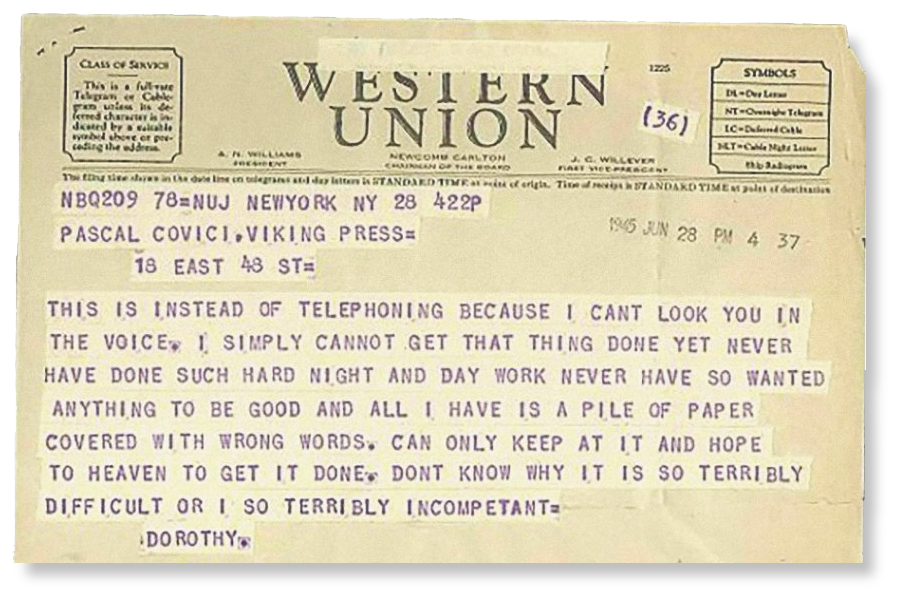This is exactly how I feel.
writers block
Dorothy Parker, blocked
In June 1945, Dorothy Parker telegrams her editor to inform him she has writer’s block:

Via Letters of Note.
Fitzgerald: “utter helplessness”
I am thirty-six years old. For eighteen years save for a short space during the war writing has been my chief interest in life, and I am in every sense a professional. Yet even now when, at the recurrent cry of “Baby Needs Shoes,” I sit down facing my sharpened pencils and a block of legal-sized paper, I have a feeling of utter helplessness. I may write my story in three days or, as is more frequently the case, it may be six weeks before I have assembled anything worthy to be sent out. I can open a volume from a criminal law library and find a thousand plots. I can go into highway and byway, parlor and kitchen, and listen to personal revelations that at the hands of other writers might endure forever. But all that is nothing — not even enough for a false start.
F. Scott Fitzgerald, “One Hundred False Starts” (1933)
Joan Acocella: Blocked

“Yesterday was my Birth Day,” Coleridge wrote in his notebook in 1804, when he was thirty-two. “So completely has a whole year passed, with scarcely the fruits of a month. —O Sorrow and Shame…. I have done nothing!”
In a 2004 piece in the New Yorker, Joan Acocella considers writers block. Why exactly do writers stop writing? (Pictured: Samuel Taylor Coleridge, one of the first known sufferers of writers block, a condition that does not seem to have existed, as such, before the early 19th century.)
The desire to matter
The desire to matter as much as we once did to our mother is at the broken heart of all narcissistic endeavour, whether it’s writing novels, tweeting or carrying the right kind of handbag. Writing fiction is the symptom of many psychological distortions — a terror of mortality among them — the most poignant of which is a longing for perfect recognition, perfect understanding. This is the illusion hovering at the end of every painstakingly edited line. There was a time when Franzen’s mother imitated his “wuh” sound, mimicked his O-shaped gape, as if it was a work of genius, as if it mattered to the culture. The secret motivation of even the most gifted writer may be to enjoy this again — this is our blueprint for the experience of mattering — and “writer’s block” is perhaps a fancy way of describing the moments in which this seems impossible.